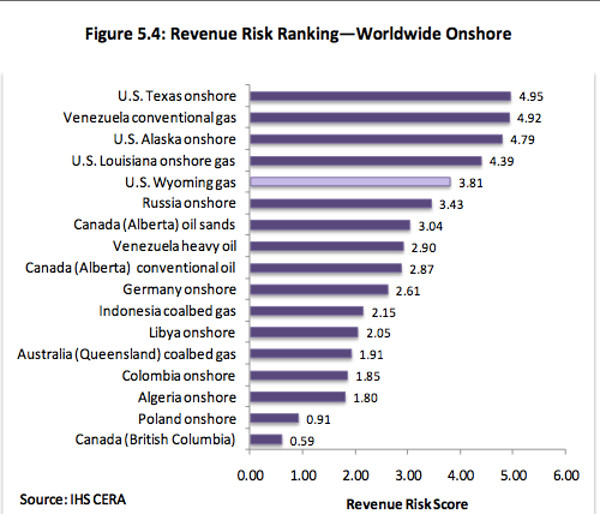The technique of horizontal drilling has doubled or even tripled the percentage of crude oil that industry now extracts from formerly uneconomic basins in Western Canada.
Of about 3,000 oil wells planted in Alberta in 2012, 77 per cent were horizontal wells that blasted tight rocks with multi-stage hydraulic fracturing to coax out hydrocarbons, according to the Alberta Energy Regulator.
Over the first eight months of last year, regulators licensed nearly 6,000 horizontal wells in western Canada in total or nearly 72 per cent of all wells.
More and more, the pace of such fracking activity is supported by heavy government subsidies and incentives to industry.
Saskatchewan, Alberta and Manitoba governments now let industry take home more money from fracking operations for tight or heavy oil than do their U.S. counterparts.
The National Energy Board reports that industry in Saskatchewan can walk home with the first 38,000 barrels royalty-free.
The board also notes that "Alberta imposes a five per cent royalty on the first 50,000, 60,000, or 70,000 barrels, depending on well specifics."
In contrast, most states south of the border will charge a 12 per cent royalty on unconventional hydrocarbons.
An analysis by Barry Rodgers of Barry Rodgers Oil and Gas Consulting published in 2013 confirms the scale of the giveaway.
He found that U.S. fiscal systems take home a greater percentage of revenues for tight oil requiring fracking than Canadian governments, due to higher tax and royalty rates.
The average state government takes home a 61.1 per cent share of revenue compared to 44.8 per cent for Canadian provinces.
Both Louisiana and Texas governments take home a greater share of revenue than any Canadian jurisdiction.
Alberta recorded the highest share in Canada at 50 per cent, while Saskatchewan represents the lowest overall share at 40 per cent.
"After incentives, Alberta's royalty share is about 10 percentage points lower than that of Texas, but still higher than that of the other Canadian jurisdictions," reported Rodgers.
Rodgers offered two explanations for the differences.
Unlike the U.S., where much oil and gas development takes place on private land, Canadian governments "are often concerned with maintaining or even increasing the level of industry activity and employment, thus opting for a somewhat lower share of direct revenues."
Rodgers adds that the "hard bargain" driven by private landowners combined with relatively high upfront fixed royalties "represents added incentive for U.S. producers to innovate and lower costs."
BC royalty regime 'riskier': report
British Columbia currently doesn't produce very much tight oil, but the provincial government has repeatedly lowered royalties for shale gas resources by at least 24 per cent to drive development over the last couple of years.
The B.C. government also subsidizes water consumption, geoscience, and road construction in remote areas.
Under B.C.'s Royalty Credit Program, an oil and gas company can build a $50-million pipeline or $25-million road, and then receive up to a 50 per cent break in royalties from producing shale gas wells.
Since 2004, B.C. has subsidized 1,243 miles worth of roads and 1,304 miles worth of pipelines at a cost of $840 million, while natural gas prices have fallen.
B.C.'s royalty regime is also different than most other jurisdictions in North America -- and it's much riskier than most, according to a report by Cambridge Energy Resources Associates and published by the U.S. Bureau of Ocean Energy Management in 2011.
Most governments take a greater share of resource revenue early in the producing life of gas well, because it poses the least risk to the owners of the resource in terms of price volatility and rapid depletion rates.
The report ranks fiscal regimes in North America on the basis of revenue risk on a scale of zero to five.
Governments that earned a high percentage of revenue early in the life of producing wells, such as Texas and Alaska, earned scores of higher than four.
Jurisdictions that expect to earn money at the end of a well's lifecycle earned zero. B.C. earned a score of 0.59.

Due to declining gas prices and revenues last year, the government was faced with a billion-dollar deficit that resulted in severe cuts to public services.
The CERA report explains that the exception to how North American governments earn revenue from oil and gas is B.C., "which has designed a back-end loaded fiscal system for shale gas resources whereby the government undertakes a significant share of the revenue risk."
Rodgers warns in his report that Canada's general system of taking a small share of revenue for the owner for unconventional resources and giving more to industry could have a big downside.
"Jurisdictions and producers would seem well advised to plan for a time when the full environmental costs will have to be incorporated. The social license to operate may very well demand it." ![]()
Read more: Energy, Environment

















Tyee Commenting Guidelines
Comments that violate guidelines risk being deleted, and violations may result in a temporary or permanent user ban. Maintain the spirit of good conversation to stay in the discussion.
*Please note The Tyee is not a forum for spreading misinformation about COVID-19, denying its existence or minimizing its risk to public health.
Do:
Do not: